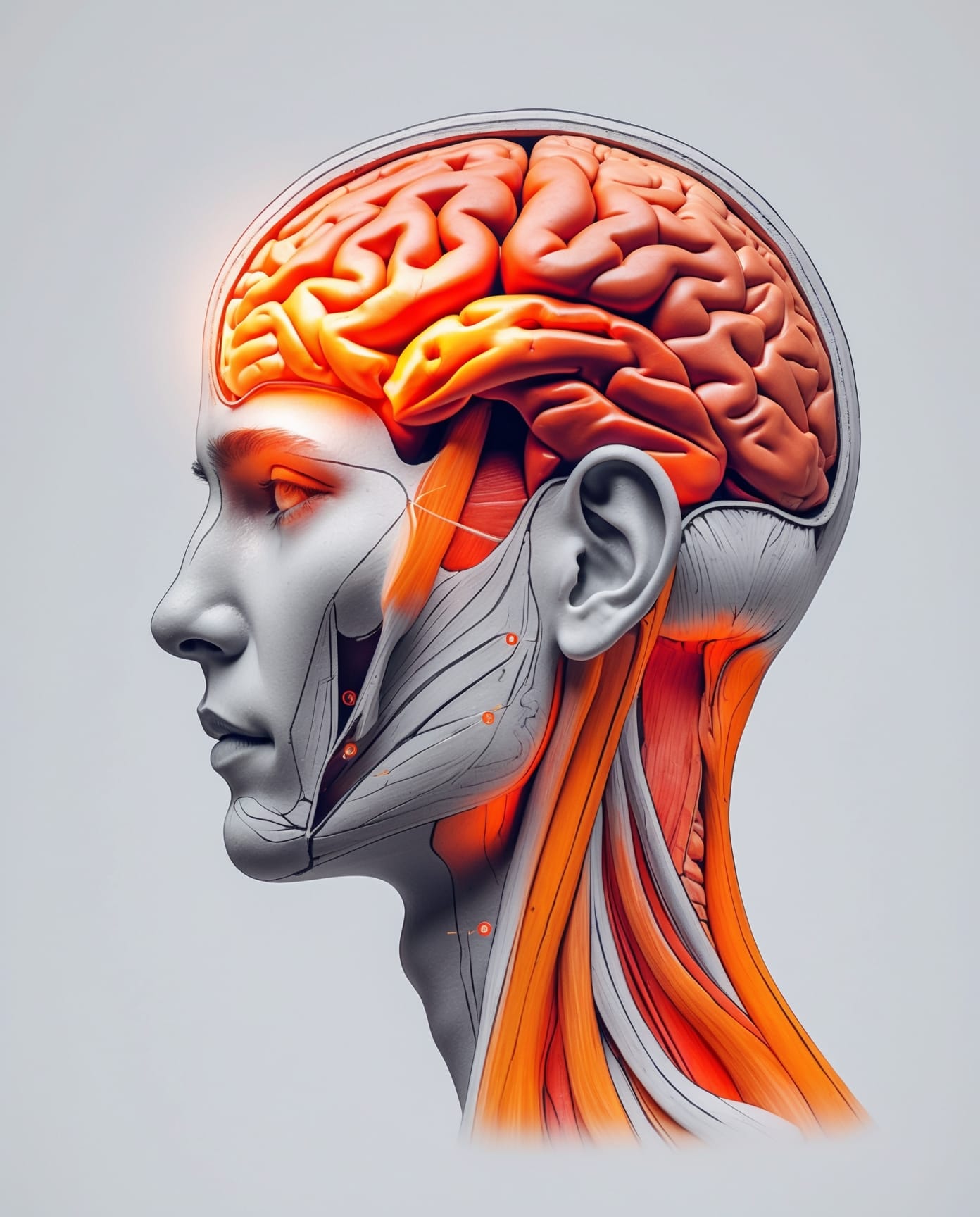When Shame Causes Physical Pain

When Shame Causes Physical Pain: 7 Body Symptoms You Can't Ignore
How Your Emotions Trigger Real Inflammatory Responses That Create Measurable Physical Symptoms
By Nura Noor, BSc Pharmacology (King's College London)
Specialized in Neuroimmunology Under Professor Alan Gibson

When Sarah walked into her team meeting three minutes late, every head turned. Her mind went blank as she tried to explain the traffic delay, words stumbling out in a jumbled mess. The familiar burn of embarrassment flooded her cheeks, but within hours, something else started, a pounding headache, nausea, and muscle tension that lasted for days.
"My doctor says everything's normal," Sarah told me during our consultation, "but I know these physical symptoms only happen after I feel ashamed or embarrassed. Am I losing my mind?"
As a pharmacologist who studied neuroimmunology at King's College London under Professor Alan Gibson, I could tell Sarah exactly what was happening in her body. Shame does not just hurt emotionally, it creates measurable inflammatory cascades that produce very real physical symptoms.
If you have noticed your body rebelling after embarrassing moments, criticism, or social rejection, you are not imagining things. Research published in Nature Reviews Neuroscience demonstrates that social pain activates identical neural pathways to physical injury, triggering inflammatory responses throughout your system.
The Science Behind Emotional Inflammation
When you experience shame, your brain immediately signals danger to your immune system. Within minutes, your body releases inflammatory chemicals called cytokines, the same molecular messengers released during infection or tissue damage.
Here is what happens in your body during a shame episode:
- Threat Detection: Your anterior cingulate cortex, the brain's social pain processor, activates
- Immune Activation: Inflammatory cytokines, IL-1β, TNF-α, IL-6, flood your system
- Physical Manifestation: These chemicals create tangible symptoms throughout your body
- Recovery Phase: Your body attempts to resolve the inflammatory response
The critical difference: while physical inflammation helps heal damaged tissue, shame causing physical pain often becomes stuck in overdrive, creating chronic symptoms that doctors struggle to diagnose because they are looking for physical causes of biochemical problems.
Studies from UCLA's Social Cognitive Neuroscience Laboratory show this shame inflammation connection affects brain function, sleep quality, digestive health, muscle tension, and immune system balance.

The 7 Physical Warning Signs of Shame Induced Inflammation
1. The "Shame Headache" Pattern
If you notice headaches consistently following embarrassing moments, criticism, or social rejection, you are experiencing a documented neurobiological response. These are not stress headaches, they are inflammation headaches.
What Is Happening: Shame triggers inflammatory cytokines that affect blood vessels in your brain and create muscle tension in your neck and shoulders. Research in Frontiers in Human Neuroscience confirms that social rejection activates pain pathways identical to those involved in tension headaches.
- Headaches that start during or immediately after shame triggers
- Pain often beginning at the base of your skull or temples
- Accompanied by brain fog or difficulty concentrating
- Limited relief from over the counter medications
- Tension that starts in your jaw, neck, or shoulders before becoming a headache
2. The Gut Brain Shame Connection

Your gut contains more nerve cells than your spinal cord, which makes it exquisitely sensitive to emotional states. When shame hits, your digestive system often rebels first.
The Biological Process: Shame signals from your brain directly affect digestive function through the vagus nerve and gut brain axis. Research published in Gastroenterology demonstrates that emotional stress triggers measurable changes in gut inflammation and motility.
- Nausea or stomach pain during conflict or criticism
- Digestive issues that worsen during socially stressful periods
- Loss of appetite after shame triggers
- Chronic digestive problems that correlate with emotional patterns
The deeper concern: chronic shame can lead to persistent gut inflammation, food sensitivities, and digestive dysfunction that continues even when you are not actively feeling embarrassed.
3. Muscle Tension and Unexplained Body Pain
If you find yourself carrying tension in specific areas after emotional stress, tight shoulders, clenched jaw, aching back, you are experiencing the muscular component of shame causing physical pain.
Why Shame Affects Your Muscles: Emotional stress creates the same muscle bracing responses as physical danger. When shame becomes chronic, muscles stay partially contracted, which leads to inflammation in surrounding tissues.
- Shoulders that feel like they are carrying the weight of the world
- Jaw tension or teeth grinding, especially at night
- Lower back pain during emotionally challenging periods
- Neck stiffness that provides only temporary relief with massage
Studies in The Journal of Pain confirm that chronic muscle tension from emotional stress creates localized inflammation that perpetuates pain cycles even after the emotional trigger has passed.
4. The Shame Fatigue Syndrome
Do you feel utterly drained after social interactions, even positive ones? Does criticism or embarrassment leave you exhausted for days? You are experiencing the metabolic cost of emotional inflammation.
The Energy Drain: Inflammatory cytokines interfere with cellular energy production in your mitochondria. Your body literally uses more energy to manage shame induced inflammation, leaving less available for daily activities.
- Disproportionate exhaustion after social events
- Needing excessive sleep after emotional stress
- Energy crashes that coincide with shame triggers
- Physical fatigue that does not improve with rest
Research in Brain, Behavior, and Immunity shows that inflammatory cytokines directly impair mitochondrial function, creating the biochemical basis for shame related fatigue.
5. Sleep Disruption and Nervous System Overdrive
If embarrassing situations replay in your mind at bedtime, or you wake at 3 AM anxious about social interactions, your sleep architecture is being disrupted by shame induced inflammation.
The Biological Mechanism: Inflammatory cytokines interfere with sleep promoting hormones like melatonin while keeping stress hormones elevated. Research in Nature Reviews Neuroscience demonstrates that inflammation directly disrupts sleep stages crucial for emotional processing.
- Racing thoughts about social situations at bedtime
- Waking between 1 and 4 AM with anxiety about interactions
- Restless sleep that does not feel refreshing
- Feeling wired but tired after shame episodes
6. Brain Fog and Cognitive Disruption
When shame causes physical pain, it also affects your brain's ability to think clearly. If you have noticed difficulty concentrating, forgetfulness, or mental cloudiness after shame episodes, you are experiencing neuroinflammation.
The Neuroinflammatory Effect: Cytokines in your brain interfere with neurotransmitter function, affecting memory consolidation, attention, and executive function.
- Forgetting important details during or after social stress
- Difficulty making decisions when feeling ashamed
- Mental fuzziness that makes work challenging
- Problems with word recall or clear articulation
Studies in Biological Psychiatry confirm that inflammatory cytokines directly impair cognitive function, creating measurable deficits in attention, memory, and processing speed.
7. Immune System Confusion and Frequent Illness
If you find yourself getting sick more often during emotionally stressful periods, or minor infections take longer to heal, your immune system is struggling with the constant inflammatory load from shame responses.
The Immune Paradox: Chronic shame creates ongoing low level inflammation that eventually exhausts your immune resources, which makes you more vulnerable to actual pathogens.
- Frequent colds during stressful periods
- Slow healing from cuts or minor injuries
- Skin issues that correlate with emotional stress
- Allergic reactions that worsen during shame cycles
Research in Health Psychology demonstrates that chronic emotional stress significantly impairs immune function through sustained inflammatory activation.

Breaking the Shame Body Pain Cycle: Evidence Based Interventions
Understanding that shame causes physical pain through measurable biological processes opens up targeted intervention strategies that address both the emotional triggers and inflammatory responses.
Strategy 1: The Immediate Anti Inflammatory Reset
- Cool Your Inflammatory Response: Apply a cold washcloth to your wrists or neck for 2 to 3 minutes. Cold therapy directly reduces cytokine production and inflammatory activity.
- Activate Your Vagus Nerve: Practice 4 2 8 breathing, inhale for 4, hold for 2, exhale for 8. This stimulates parasympathetic activation and interrupts inflammatory signaling.
- Metabolize Stress Chemicals: Do 30 seconds of gentle movement, shake your hands, roll shoulders, or walk. Movement helps process inflammatory mediators.
Research published in Science by Dr. Matthew Lieberman at UCLA confirms that these techniques directly interrupt inflammatory cascades at the cellular level.
Strategy 2: Daily Anti Inflammatory Protocol
- Morning Nervous System Regulation: 5 to 10 minute meditation or breathwork to set autonomic tone
- Anti Inflammatory Nutrition: Omega 3 fatty acids, leafy greens, berries, and other anti inflammatory foods
- Evening Tension Release: Gentle stretching or yoga to prevent chronic muscle inflammation
- Weekly Joy Practice: Activities that genuinely bring pleasure and reduce baseline stress
Strategy 3: Interrupt the Thought Body Loop
- Notice Without Judgment: I am experiencing tension in my shoulders
- Connect to Emotion: This started after that difficult conversation
- Normalize the Response: My body is responding to perceived social threat
- Redirect With Compassion: I can help my nervous system feel safe now
Strategy 4: Environmental Safety Signal Creation
- Physical Comfort: Warm baths, heating pads, soft textures
- Environmental Soothing: Soft lighting, calming music, familiar spaces
- Social Safety: Connect with supportive people who do not judge your struggles
- Emotional Validation: Self compassionate self talk that acknowledges your experience

When Professional Support Is Essential
- Physical symptoms are severe or interfere with daily functioning
- You develop new symptoms that concern you
- Symptoms persist despite emotional healing work
- You have chronic conditions that seem connected to emotional stress
Specialized Support for Complex Shame Body Patterns
- Saela, Our Shame Transformation Coach specializes in helping women heal shame patterns that create physical symptoms
- Luna, Our Sleep Optimization Coach addresses shame related sleep disruption and inflammatory cycles
- Mara, Our Anxiety Navigation Coach works with nervous system regulation and anxiety inflammation connections
- Our Founding Sister Bundle provides comprehensive support for interconnected emotional and physical healing
The Transformation Potential: From Pain to Wisdom
Learning about shame causing physical pain is not just about managing symptoms, it is about developing a collaborative relationship with your body where physical sensations provide information without overwhelming your system.
Your body is not broken. It is responding appropriately to emotional threats using protective mechanisms designed to heal physical injury. The key is helping it recognize when threats have passed and it is safe to return to balance.
Your inflammation can teach you. Physical symptoms often contain wisdom about emotional patterns, relationship dynamics, or life circumstances needing attention. Learning to listen to these messages guides you toward deeper healing.
Your nervous system wants to heal. Given appropriate conditions, safety, support, and understanding, your body's natural anti inflammatory processes can restore balance and break shame pain cycles.
Your Body Wisdom Action Plan
Week 1: Recognition Phase
- Track connections between shame triggers and physical symptoms
- Practice the immediate anti inflammatory reset during acute episodes
- Begin daily nervous system support practices
Week 2: Intervention Phase
- Implement daily anti inflammatory protocol
- Start interrupting thought body loops when symptoms arise
- Create environmental and emotional safety cues
Week 3: Integration Phase
- Fine tune understanding of personal shame body patterns
- Develop personalized toolkit of effective interventions
- Consider professional support if patterns persist
Week 4: Expansion Phase
- Explore deeper emotional healing for persistent triggers
- Build relationships that support rather than trigger shame
- View your body as wise messenger rather than broken system
Beyond Symptom Management: Embodied Wisdom
The goal is not eliminating all physical responses to emotional stress. That is neither possible nor healthy. Instead, develop a collaborative relationship with your body where sensations provide information without overwhelming your system.
Understanding that shame causes physical pain through legitimate biological processes can transform your relationship with both emotional and physical symptoms. You are not too sensitive, overreacting, or broken. You are experiencing normal human neurobiology that can be understood and worked with skillfully.

Related Articles
Why Shame Hits So Much Harder After 40: The Hidden Changes Making You More Sensitive
Discover the neurobiological reasons shame feels more intense during midlife and how to work with your changing emotional landscape.
How to Break the Shame Insomnia Cycle: 7 Science Backed Strategies
Learn why shame disrupts sleep and evidence based techniques to restore restorative rest after emotional triggers.
Why Your Mother's Voice Still Controls Your Inner Critic: 5 Signs of Hidden Mother Wounds
Explore how early attachment patterns create shame sensitivity and physical symptoms that persist into adulthood.
